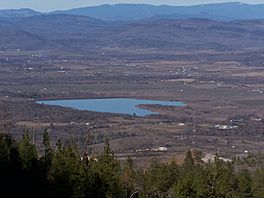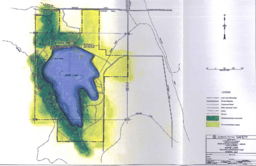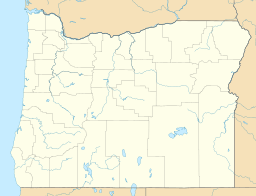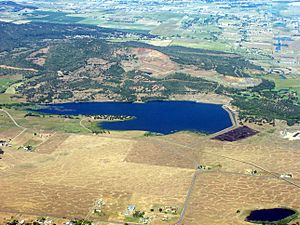Agate Lake facts for kids
Quick facts for kids Agate Lake |
|
|---|---|

Agate Lake from Roxy Ann Peak
|
|

A map of Agate Lake
|
|
| Location | Jackson County, Oregon |
| Coordinates | 42°24′39.05″N 122°46′13.65″W / 42.4108472°N 122.7704583°W |
| Type | Reservoir |
| Primary inflows | Dry Creek, Antelope Creek |
| Primary outflows | Dry Creek |
| Basin countries | United States |
| Surface area | 216 acres (0.87 km2) |
| Average depth | 68 feet (21 m) |
| Max. depth | 72 feet (22 m) |
| Water volume | 4,782 acre-feet (5,899,000 m3) |
| Shore length1 | 3 miles (4.8 km) |
| Surface elevation | 1,510 feet (460 m) |
| 1 Shore length is not a well-defined measure. | |
Agate Lake is a reservoir (which is like a big, artificial lake) in Jackson County, Oregon, United States. It sits about 1,510 feet (460 m) above sea level. You can find it about 13 miles (21 km) northeast of Medford, just north of a place called Roxy Ann Peak. The lake was made by building the 86-foot (26 m) tall Agate Dam across Dry Creek. This creek is part of the larger Rogue River watershed, which is the area of land where all the water drains into the river.
Contents
Building Agate Lake
The idea to build Agate Dam was approved in 1962. Construction began in 1965 and was finished in 1966. The dam is an 86-foot (26 m) tall embankment dam, which means it's made of earth and rock. It was built by a group called the Talent Division of the Rogue River Basin Project.
How the Lake Works
Agate Dam holds back the water from Dry Creek. Two special channels, called canals, were also built. One channel brings extra water from nearby Antelope Creek into the lake. The second channel, called the Dry Creek Diversion Canal, lets water out of the lake in a controlled way. This water is mostly used by farmers for irrigation (watering crops) during the summer months. Because so much water is used, the lake often gets very low by September each year.
Recreational Facilities
When the lake was first built, some fun places were added for people to use. These included a boat ramp, picnic areas, and parking lots. Sadly, some of these, like the picnic areas, were removed because of too much damage. Today, there are still three parking areas around the lake for visitors.
Lake Facts and Figures
Agate Lake gets about 23 inches (580 mm) of rain and snow each year. The weather here can change a lot. Summer temperatures can reach highs of 89 °F (32 °C), while winter lows can drop to 22 °F (−6 °C). The wind usually blows between 10 to 15 miles per hour (16 to 24 km/h).
Size and Depth
The lake's surface area is usually about 216 acres (0.87 km2), and it holds about 4,782 acre-feet (5,899,000 m3) of water. It sits 1,510 feet (460 m) above sea level. However, the water level can go up or down by as much as 25 feet (7.6 m) throughout the year, depending on how much water is used for irrigation. The lake has about 3 miles (4.8 km) of shoreline.
Agate Dam Details
The Agate Dam itself is 86 feet (26 m) tall. It is 25 feet (7.6 m) wide and stretches for 3,800 feet (1,200 m) across the land. There's also a spillway (a channel for excess water to flow over) that can handle 3,300 cubic feet per second (93 m3/s) of water.
Plants and Animals
Before Agate Dam was built, Dry Creek would sometimes dry up, so it didn't have many fish. The areas along the creek, called the riparian zone (the land right next to the water), have different plants depending on where you are.
Plants Around the Lake
- Upstream (south of the lake): You can find trees like willows, cottonwoods, and alders.
- North of the lake: Here, you might see blackberries, willows, alders, madrones, white oaks, and ponderosa pine trees.
- West side of the lake: This area is mostly oak savanna, with many white oak and madrone trees. Common shrubs include buckbrush and sometimes poison oak.
- South side of the lake: This part is mainly grassland. Some plants that are not native to the area, like star thistle, have grown here.
- Northwest side: More grassland can be found here, with special vernal pools that fill with water in the spring.
Rare Species in Vernal Pools
When the vernal pools are full, they are home to a threatened species of tiny fairy shrimp called branchinecta lynchi. You can find them in the winter and early spring. A rare flower called the big-flowered woolly meadowfoam also grows in these pools. These plants are special because they are only found in the Agate Desert region.
Animals at Agate Lake
Black-tailed deer visit the area in the spring, summer, and fall. Over 190 different kinds of birds have been seen around the lake, making it a great spot for birdwatching! The lake is also home to various fish, including largemouth bass, smallmouth bass, bluegill, catfish, and crappie.
Fun at Agate Lake
Agate Lake is a popular spot for outdoor activities. You can use boats with only non-motorized (like canoes or kayaks) or electric motors on the lake. Swimming, angling (fishing), and picnicking are also popular things to do.
If you visit in the late summer or early fall, when the lake's water level is lower, you might even find cool rocks like agates and petrified wood along the shore! The Jackson County Parks Department estimates that about 5,000 people visit Agate Lake every year.
 | Claudette Colvin |
 | Myrlie Evers-Williams |
 | Alberta Odell Jones |





